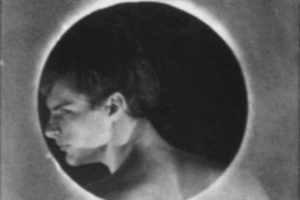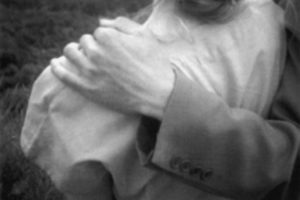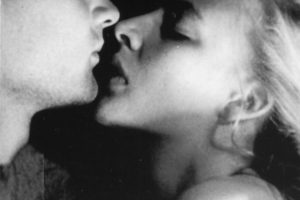
EXPRMNTL/ÂGE D’OR » Gregory J. Markopoulos
Gregory J. Markopoulos
Toledo, 1928 – Freibourg im Breisgau, 1992
Gregory J. Markopoulos est un des plus importants cinéastes indépendants américains. Il fut, dans les années 1950-1960, un des protagonistes du New American Cinema Group, aux côtés de Jonas Mekas, Robert Frank et Shirley Clarke. Contemporain d’Anger, Brakhage, Deren et Warhol, il contribua à l’établissement du cinéma en tant que forme artistique autonome. Au cours de sa carrière, Markopoulos a développé un langage cinématographique propre, fondé sur une conception musicale du montage et un usage symbolique de la couleur. Enfant d’immigrés grecs, la mythologie a façonné son imaginaire. Psyche ou Twice a Man (primé lors du festival EXPRMNTL de Knokke en 1963) sont travaillés par l’idée d’intégrer le mythe dans la contemporanéité. Markopoulos est aussi un des premiers cinéastes à aborder explicitement le sujet de l’homosexualité. Un dévouement total à sa vision du cinéma le conduit, en 1967, avec son compagnon Robert Beavers, à quitter les États-Unis pour s’établir en Grèce. Cet exil s’accompagne de la décision de retirer tous ses films de la circulation. Markopoulos commence alors à remonter ceux-ci au sein d’une œuvre qu’il veut définitive, Eniaios, dont la durée prévue est de 80 heures et dont la projection ne pourra avoir lieu que sur le site de Temenos, près du lieu de naissance de son père. Si Eniaios ne fut jamais achevé de son vivant, c’est ce projet d’un site idéal où le travail de Markopoulos pourrait être vu en harmonie avec le paysage que Beavers travaille à concrétiser depuis la mort de son compagnon, en organisant tous les quatre ans des projections des nouveaux segments d’Eniaios qu’il a pu tirer entre-temps.
Ce programme coïncide avec la parution du livre Film as Film: The Collected Writings of Gregory J. Markopoulos. Edité par le curateur Mark Webber et publié par The Visible Press (Londres), cet ouvrage compile en un imposant volume, et pour la première fois, près d’une centaine de textes rares ou inédits dans lesquels Markopoulos réfléchit sa pratique cinématographique mais aussi celle d’auteurs tels que Dreyer, Bresson et Mizoguchi.
Gregory Markopoulos was een van de belangrijkste Amerikaanse onafhankelijke filmmakers. In de jaren 1950 en 1960 was hij een hoofdrolspeler in de New American Cinema Group, naast Jonas Mekas, Robert Frank en Shirley Clarke. Als tijdgenoot van Anger, Brakhage, Deren en Warhol leverde hij een belangrijke bijdrage aan de grondlegging van film als autonome kunstvorm. In de loop van zijn carrière ontwikkelde Markopoulos een eigen filmtaal, gebaseerd op een muzikale opvatting van montage en een symbolisch gebruik van kleur. Als kind van Griekse immigranten heeft de mythologie zijn verbeelding gevormd. Psyche of Twice a Man – waarmee hij een prijs op het EXPRMNTL festival van Knokke verdiende – vertrekken vanuit het idee mythen te integreren in het hedendaagse. Markopoulos was ook een van de eerste cineasten die het aandurfde om expliciet de thematiek van de homoseksuele identiteit aan te snijden. Een algehele toewijding aan zijn visie op film bracht hem er in 1967 toe met zijn partner Robert Beavers de Verenigde Staten voor Griekenland te ruilen. Die ballingschap viel samen met zijn beslissing zijn films uit circulatie te nemen. Markopoulos begon vervolgens zijn films te hermonteren tot een definitief en allesomvattend oeuvre, getiteld Eniaios, dat een voorziene duur had van 80 uur en enkel vertoond zou mogen worden op de Temenos-site vlakbij de geboorteplaats van zijn vader. Bij leven kon Markopoulos Eniaios niet afmaken maar sinds zijn dood concretiseert zijn metgezel Beavers het project waarbij het werk van Markopoulos getoond kan worden op een ideale locatie in harmonie met het landschap. Zo organiseert hij elke vier jaar vertoningen van nieuwe segmenten uit Eniaios die hij in de tussentijd heeft kunnen laten ontwikkelen.
Dit programma valt samen met de publicatie van het boek Film as Film: The Collected Writings of Gregory J. Markopoulos. Het door curator Mark Webber bewerkte en door The Visible Press (Londen) gepubliceerde werk verzamelt in één indrukwekkend volume, en voor het eerst, bijna honderd zeldzame of onuitgegeven teksten waarin Markopoulos nadenkt over zijn eigen filmpraktijk en over auteurs als Dreyer, Bresson en Mizoguchi.
Gregory Markopoulos is one of the most important American independent filmmakers. From 1950-1960 he was one of the central figures of the New American Cinema Group alongside Jonas Mekas, Robert Frank and Shirley Clarke. Contemporary of Anger, Brakhage, Deren and Warhol, he significantly contributed to the establishment of cinema as an independent art form. During his career, Markopoulos developed his own filmmaking language, based on a musical conception of editing and a symbolic use of colour. Son of Greek immigrants, mythology shaped his imagination. Psyche or Twice a Man – a film that won an award at the EXPRMNTL Festival in Knokke-le-Zoute in 1963 – are all based on the idea of integrating myth in a contemporary setting. Markopoulos is also one of the first filmmakers to explicitly address the topic of homosexual identity. In 1967, total devotion to his vision of cinema leads him with his companion filmmaker Robert Beavers, to leave the United States and settle in Greece. This exile is accompanied by the decision to withdraw all his films from circulation. Markopoulos then brings them all together in a major and ultimate work: Eniaios, previewed to last 80 hours. The screening could only take place on the site of Temenos, near the birthplace of his father. Although Eniaios was never completed during his lifetime, the project of an ideal site where Markopoulos’ work can be seen in harmony with the landscape is maintained by Robert Beavers who strives to make this a reality since the death of his companion by organising every four years, screenings of new segments of Eniaios that he has been able to process and print.
This programme coincides with the publication of the book Film as Film: The Collected Writings of Gregory J. Markopoulos. Edited by curator Mark Webber and published by The Visible Press (London), the book compiles nearly a hundred rare and unpublished texts, in which Markopoulos reflects on his filmmaking as well as that of authors like Dreyer, Bresson and Mizoguchi.



